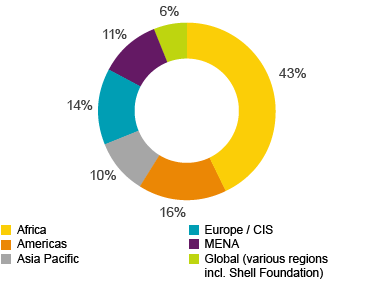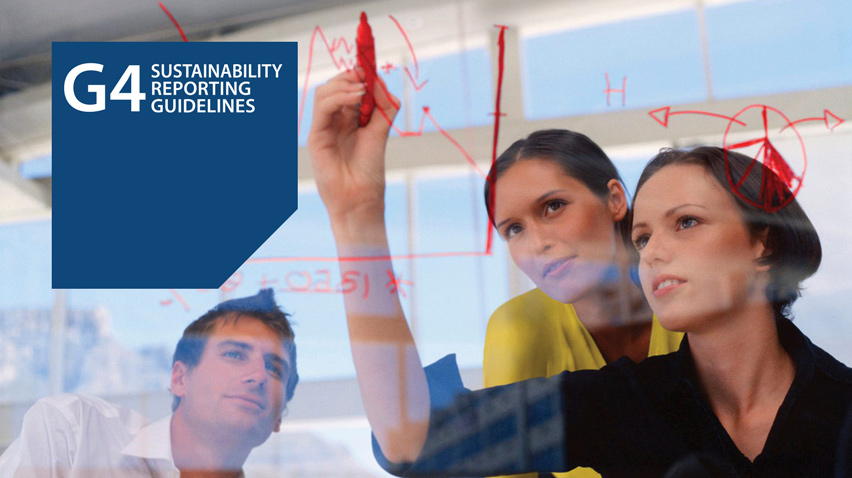Investing in communities
Investing in the communities where we operate enables local people to participate in the benefits that industrial development can bring, and is central to the way we do business. We develop social investment projects that are closely aligned with our business.
In 2016, following the integration of BG, we reflected on our social investment strategy and made science, technology, engineering and mathematics (STEM) education one of our three core themes, with the aim of making a more positive impact on future generations through education. The key global social investment themes are:
- access to energy;
- boosting local skills and enterprise; and
- STEM education.
Shell teams can also implement local programmes on other community topics, such as conservation, road safety and health, that are connected to our business.
Access to energy
More than 1.1 billion people in the world have no electricity – and a billion more only have access to unreliable and unsafe power networks. Nearly 3 billion people rely on solid fuels for cooking. The ability to obtain reliable and safe energy enables economic and social development, and improves the health, education and livelihoods of people around the world. At Shell, we apply our core business skills and technical resources to bring energy to communities that need it and where we have a presence.
In the Philippines, through the Pilipinas Shell Foundation, we funded a micro-grid that uses hydropower and solar energy to power an indigenous village in Palawan. It provides the local Batak tribe with a continuous electricity supply. In 2016, we launched another micro-grid programme for a fishing community, mainly using wind, backed up by solar and diesel.
In Nigeria, we created an independent, not-for-profit company to help establish the market for off-grid renewable energy in the country. Together with its partners, the company will provide investments and technical support to address energy poverty in unserved and underserved communities.
Clean cookstoves
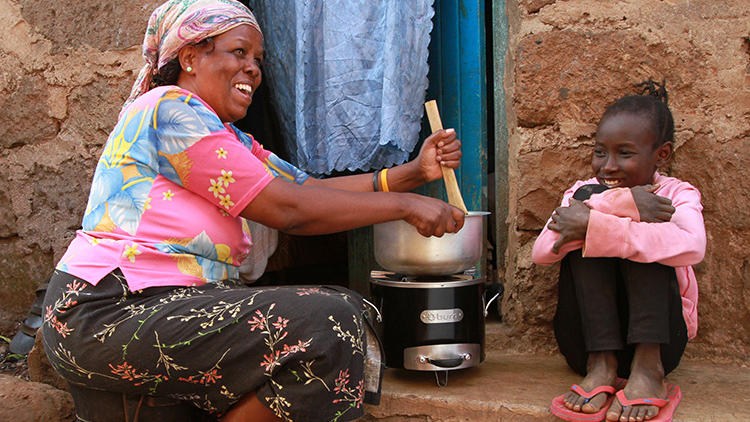
The alliance’s goal is for 100 million households to gain access to clean and efficient cookstoves and fuels by 2020.
Shell is one of the founding partners of the Global Alliance for Clean Cookstoves, a public-private partnership that helps to create a thriving global market for clean and efficient household cooking solutions.
Since 2010, we have pledged $12 million to the alliance and provided in-kind support on leadership, business and technical skills. We have also contributed half of the alliance’s Spark Fund, a grant facility that supports the development of clean cooking enterprises globally.
Shell’s support to the alliance builds on the work of Shell Foundation, an independent charity that helped to set up the Alliance, together with the UN Foundation and US State Department.
In 2016, Shell co-funded seven pilot projects in China to explore a more market-driven approach to promoting clean cookstoves and fuels. This helped 75 new fuel distributors start up and gave 250,000 households access to clean cooking fuels. In India, we sponsored a workshop for 14 cookstove and fuel businesses to help them grow in a sustainable way and support their applications for future funding.
By the end of 2016, the alliance and its partners had distributed around 53 million clean stoves. The target is to reach 100 million households by 2020.
Boosting local skills and enterprise
Shell supports the building of new businesses to generate local employment and our LiveWIRE programme helps entrepreneurs turn their ideas into reality. The programme is active in 15 countries where we operate. In 2016, 7,889 people took part in LiveWIRE and small business development programmes, and 351 businesses were established.
Shell LiveWIRE Nigeria awarded around $124,000 in business start-up funding to 50 budding young entrepreneurs from Ogoniland who successfully completed its enterprise development programme. The entrepreneurs will use their funding to start a wide range of businesses in areas such as palm oil processing, poultry farming, solar energy and waste paper recycling.
LiveWIRE entrepreneurs continue to have an economic and social impact. In 2016, five years after Shell funded their British start-up, entrepreneurs behind the GiveMeTap bottle venture pitched their idea to US President Barack Obama. GiveMeTap gives communities across Africa access to clean, safe drinking water, through pumps installed using profits from the global sales of drinking bottles. President Obama then personally selected the company as part of a Google initiative to promote entrepreneurs.
In Saudi Arabia, where LiveWIRE is called Intilaaqah, Shell trained 823 participants in 2016 - 57% of whom were women – and supported the start-up of 69 businesses.
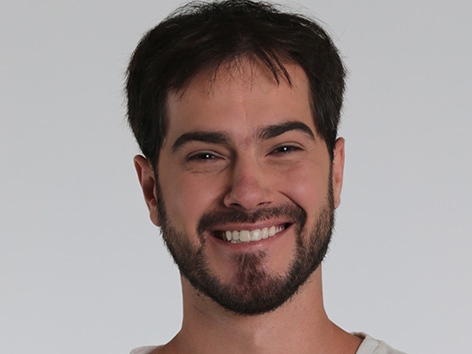
“LiveWIRE helped prepare my idea for market”
External opinion
“We are a consumers’ club supporting local agriculture by purchasing organic products from producers. The LiveWIRE programme was essential to establishing my company's roots and preparing it for business and the market.
There is a strong network among the entrepreneurs offering knowledge and connections, facilitated by the programme staff. The Shell Iniciativa Jovem LiveWIRE Brazil programme also helped me control my anxiety about my professional life. Ultimately, it allowed me take an idea, put it into perspective and turn it into a successful and structured project.”
Victor Piranda
Entrepreneur - Winner of LiveWIRE Brazil award, Clube Orgânico, Rio de Janeiro, Brazil
Local goods and jobs
Shell also invests in communities through local employment, buying goods and services from local sources and by supporting the economic development of the community.
We prioritise buying goods and services from local suppliers that meet the standards we require. In some cases, we support local businesses and skills development to meet these standards. In 2016, we spent more than $45 billion on goods and services worldwide, of which around 64% was in Canada, Nigeria, the Netherlands, the UK and the USA. In 2016, Shell spent $4.4 billion on goods and services from local companies in countries with a gross domestic product of less $15,000 a year per person.
In the UK, for example, Shell’s Upstream business spent around 47% of its contracting budget with UK companies. Around 26% of this was spent with companies based in Scotland and 21% with companies based in England and Wales.
The Nyhamna Expansion in Norway was one of Shell’s biggest brownfield projects in 2016. Here, we worked with the main contractor on the project to enable local and regional small- and medium-sized companies to compete, by developing capabilities and a supplier network. Our analysis shows that more than 80% of our spending was on Norwegian content in the project and more than $58 million of total investment in businesses in central Norway. Overall, this involved more than 150 Norwegian companies.
STEM education
Engaging children in STEM is a vital step to inspiring them to become future engineers or scientists. Shell has STEM programmes in 16 countries, including the USA, UK, Brazil, and the Netherlands.
In Brazil, we introduced a STEM education programme for less privileged children in 14 public-sector middle schools in the Rio de Janeiro and Rio Grande do Sul states. The project started in 2012 and provides teacher training, teaching aids and resources. Around 6,000 students (6–14 year-olds) and 130 teachers have taken part every year.
In the UK, Shell has invested more than £1million since 2014 in a programme called Tomorrow’s Engineers, which aims to give 11–14 year olds engineering experience with employers. With Shell’s investment, Tomorrow’s Engineers has launched a new school programme – Energy Quest – to help students explore the science and maths curriculum in a fun and engaging way. At the end of 2016 more than 35,000 students had participated. The Shell-sponsored Girls in Energy programme is also helping to remove barriers to female participation in STEM careers and now reaches 100 young women (14–16 year olds) a year.
In the Netherlands, Shell launched the Generation Discover Festival to inspire children, parents and teachers in the world of science. In 2016, more than 31,000 visitors, including 10,000 schoolchildren, attended the five-day festival.
Social investment in 2016
We voluntarily invest in projects that aim to benefit local communities over the long term, as well as invest in social programmes as part of contractual agreements or legal requirements with host governments. In 2016, we spent around $193 million on social investments worldwide, compared with $219 million in 2015.
In 2016, we spent $102 million on voluntary social investment, of which around $58 million was in line with our global themes - energy access, boosting local skills and enterprise, and STEM education. We spent around $44 million on local programmes for community development, disaster relief, education, health and biodiversity. We estimate that almost $96 million of our total spend in 2016 was in countries that are part of the United Nations Development Programme Human Development Index 2015, that is, those defined as having a gross domestic product of less than $15,000 a year per person. Significant support is also provided in the form of voluntary work by Shell employees and donations of equipment.
Social investment in 2016
proportion of spend
Enlarge image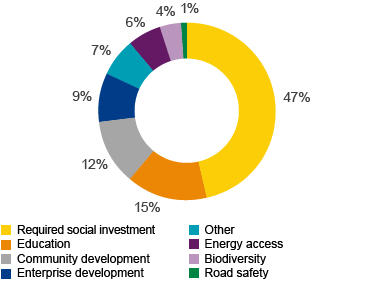
Social investment in 2016
split by region
Enlarge image